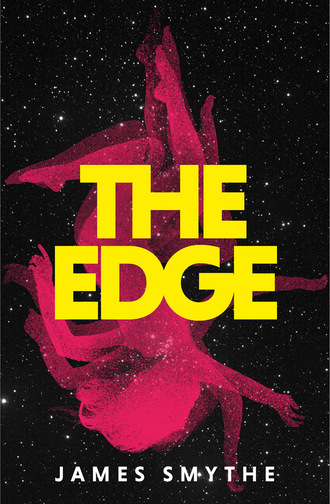
The Edge
‘Yes, well: children are wont to do as they will,’ she said, wiping her hands of it; but then Xavier called me the very next day and told me that he had changed his mind. He was going to fly Theo to Florida, so that I could see him and say my goodbyes. I didn’t like that conversation, because he said it all with such an air of finality, as if he assumed that I wouldn’t be returning home at the other end. He stood there when I held Theo, not giving me any time alone with him. He waited there for the whole conversation, standing in the corner by a window, like a fucking wraith. We were in one of the beige holding rooms in the launch facility, and we ate the sandwiches that were prepared for us – tuna fish and salad, and I can still taste them, that’s how strong that memory is – and I remember thinking that it was so strange: that this would be the last real food I would eat for the next few months, probably.
I didn’t think that it would be the last time I held Theo for that time, because I could only smell those sandwiches, even as I tried to breathe in his hair. It was only afterwards that I realized that Theo had changed his shampoo; or, Xavier had changed it for him. My son’s scent, suddenly different. The memory of his smell fading almost completely in that sensory overwhelm.
I asked Xavier to let Theo stay with me that final night and he denied me. He said that I was too busy, his tone snide. Too stressed, and he said it in that pointed way he tended to say everything when he wanted to refer to my health issues. And it’s a Tuesday, he said. That’s what the custody battle was about: my job, my role in all of this, and how much attention I could – or couldn’t – give to my own son. Xavier made me out to be a bad person, somebody who would ignore their family because of their work at best, or neglect at worst; somebody with issues in their past that would intrude, even after I had them redacted from the conversation, stricken from the record. The past was the past, and I didn’t even believe it in the way that Xavier did.
Lies, between us; bitterness and lies.
But the court agreed with him. I told them that I could handle both aspects of my life, but they only looked at me with pity. Of course I couldn’t.
Poor, poor Allanah: with her history, and her mind, and her ways.
The judge said that maybe it was best, until the Anomaly was sorted out, as if it was a minor discrepancy, and until I was willing to devote time to him – telling me that I was a bad mother, if not in so many words – that my boy lived with Xavier. That’s what he told me.
When I handed Theo back in the waiting room – we hoisted him between us, as if he was still a toddler, unwilling to admit to the passing of time, the growing of his body – I told Xavier to take care of him.
‘I won’t need to,’ he said. ‘The knot will do that, in the end.’
That was the first time he used the phrase to me directly. I knew he was obsessed, I knew he was going to the meetings, to what they called the sermons, but he hadn’t told me himself. And then he tried to give me something: one of his necklaces. Homemade. A crucifix, wrapped in its own chain. Strangled, the metal twisted and gnarled, then fastened in on itself. He pushed it into my palm. ‘You have to go,’ he said, ‘but maybe you’ll see this better on the other side. Maybe, when this is all done, you’ll see that we were being provided for all along.’
Then we boarded the SC3 that brought me up here. Back then, they were coming up to the station every couple of weeks with people and supplies. And I remember lying back in my chair, strapped in like this was any other test flight or simulator, and thinking that this didn’t need to be the way that it was.
Before the door shut, I saw Theo there, or I’m sure that I saw him. I think I saw him. His little head of jet-black hair, a target to concentrate on, a dark spot in my vision. I’m sure that it was him, so I waved to him, and he waved back.
Everybody was waving.
That was a memory that we both needed to have.
Time is strange here. It can be lost. You are working on something, sitting in the quiet, the cold, and you shut your eyes, and suddenly … Bang. Time has passed, and you’ve slept, or it feels as if you have, and you’re still cold and yet nothing at all has changed. I was sitting, and then my eyes were shut, tired, my head doing the ache it does, all the way down my spine. Imagining something that won’t happen: drifting out there, lost. Spiralling away from the station, nothing to cling to, towards the Anomaly as it waits to swallow me whole. Gasping in air, and feeling my chest tighten—
Then, thump, thump, the pumping of an artificial heart that powers this entire station, suddenly intruding into the peace. And I’m back, I’m here, right where I was. My head hurts, and my mouth hurts. Xavier always used to tell me that I ground my teeth, at the back. That he could hear it while I slept. He used to say that I had an underbite when I slept, because my mouth was forcing the teeth together so much.
I must have fallen asleep. I meant to sit, for a moment, but again, that sort of thing happens. The boredom; the stasis.
The air.
Xavier would say, ‘You’re like a pug when you sleep; like one of those ugly little dogs, their faces squashed up, their breathing fucked, as if they’re on the verge of stopping at any moment.’ And my chest: the ache is real, even if the reason isn’t. The air up here is thin. Balanced, supposedly, but I’ve seen the oxygen processors – I helped install them, I help maintain them – and it’s in favour of energy preservation over health.
I rinse my mouth out. I read through the jobs I was meant to be doing this week, and I try to think about their mundanity; as I’m sure they’ll all get abandoned. Nothing like the urgency of a massive fuckknowswhatitis in space to really screw with your schedule.
I smile at that, and my wrist buzzes; and for a moment, I’m taken aback, as though somebody overheard my thoughts. Don’t laugh at the Anomaly. It’s all-powerful, all-terrible.
But I’m wrong. The buzz is a summons: Dr Hyvönen wants to see me.
His quarters are enormous. They take up what was to have been the New Europe wing of the station, before they were forced to pull out over funding issues; and before the United Nations Space Agency became a thing, took this whole operation over. This was shiniest part of the station, still waiting to be unwrapped when the UN collapsed and sold it to private investors as the Anomaly got closer. So it fell to Hyvönen to finish it himself. He made it happen.
He bought the house, he chooses which bedroom he gets.
I have never been in his quarters before, though. Pretty much none of us has, because there’s never been a reason to. Only person aside from him who spends any time here is Sian. Best I can tell, working as his assistant means standing around and staring when anybody tries to move the good doctor off-track, but if that’s how she makes her living, who am I to argue? I don’t imagine many people have security access, anyway. Desh will, most likely; and, actually, probably Mon. In case Hyvönen needs her in an emergency.
But I merely build; I assemble. Compared to them, I am persona non grata.
As I walk towards it, I cycle through the reasons he could want me. His air supply. His hyperbarics. His coffee machine. So many things could need repairing.
His Earl Grey is too hot, maybe; his bath is running too cold.
These are the things I went to six years of university for, I think. To help build a spacecraft, a space station; to ultimately fix a toaster with a dodgy element.
The doors are already open, Sian waiting in the doorway for me. ‘You took your time,’ she says. She’s twenty-something, and tiny. Terrifyingly thin, but not like she’s sick – a different kind of thin to the old man – and her hair is clipped army-tight. Everything about her feels as if it’s rejecting trappings or bullshit, and I respect that. ‘He’s been waiting.’
She doesn’t bother listening for an excuse. Instead, she turns and walks off with an almost supernatural calm. Her body barely moves. An invisible book on her head that never falls, a control I can’t quite understand; until I am in the room itself, that is. The gravity is slightly different here. It’s looser, somehow. Only a little, but enough to cause a lift in your belly. Like mild indigestion. Immediately you have to adjust, to reconfigure yourself to deal with it. Must be for his benefit; to help him with his body.
Up here, we’ve become used to feeling enclosed and capsuled. We’ve accepted everything being built into the walls, the plastic of the floor being the same as the plastic of the beds, the rooms themselves moulded and joined and fastened down. Hyvönen’s room is different, though. How long has it been since I have seen somewhere that didn’t look as if it were torn from some bullshit-futuristic science fiction movie? There is actual furniture in here, and there are real books on the shelves. I recognize some of this, some of the items; they must all be classic pieces, things that are so well known they’re almost ingrained into our cultural consciousness of furniture and knick-knacks. There is a chair and matching footstool, in this rich leather that I know is real without even having to touch it, making it either a genuine antique or illegal. There is a globe here that, I know without examining it, is a drinks cabinet. And, more than that, I know that it will hold real bottles, not the paper cartons that our scant supply of alcohol comes in. Even that makes me jealous. And I wonder: why have a globe, when the real thing is there, out of a window, on a rotation for us; visible exactly like this, but with more majesty. And sure, more yellow, less green than the representation; but still. His clothes, his belongings, all affectation. The old books, leather-bound, missing protective dust jackets; audio on old wax vinyl, lined up in shelves that fit them perfectly; and video cassettes, a format that nobody has used in nearly a century now. Tapes that degrade, that need maintenance. Flawed, but original, which I suppose is the point.
Through, past this detritus, is another room. Here sits Hyvönen, his shirt off, his skin sagging and pale. There is a device on his head, a slim crown of plastic and wires, the cable from it leading to something in the corner. A big black box that takes up much of the wall. There’s a thick whirring that comes through the air; a grinding, almost. That’s how loud it is. This, I know, is a MemoRain, even though it’s the first I’ve seen outside a museum. They were withdrawn, their use made illegal, in favour of chemical treatments – so much neater, if not quite as efficient; and there were nightmare stories before they were withdrawn, about people being left vacant by the treatments, bodies with no functioning minds. And yet, he’s got one of the very same machines: memories recorded to hard drives, backed up, restorable.
I suppose that, when you’ve got Hyvönen’s money, the legality of any possession, any medical procedure, ceases to be a problem.
It makes me wonder how bad his memory actually is; if he’s being repaired to keep himself presentable – or, even, just functioning – how often does it happen?
And the fact that I am allowed to see this, that’s a fundamental shift in everything I’ve known. Why? Why me, why now? Is it out in the open?
How often does he actually collapse?
He sees me, and he smiles. A stark contrast to his earlier confusion.
He pulls the crown from his head and he picks up his shirt from behind him. His arms into the sleeves – his broken arm back to full strength already, apparently. I wonder if his restoration makes him forget he even hurt it in the first place; if whatever backup of his mind he’s running on was made before he even broke it.
He buttons the shirt while I wait, then puts a tie on. Sian stands by, to help him if he needs it; and then she reaches for him as he starts to walk towards me, but he flicks her arm away, not looking at her.
‘Miss Becker,’ he says, and he holds out his hand, as if we haven’t met before. But we have. He interviewed me over a screen; he okayed my being here. And while we have not been close workmates, I have been here, as has he. It’s likely his treatments, I think. Maybe they leave him more vague than he would otherwise have been. I wonder how much is lost to him before it’s restored. ‘Thank you for responding so swiftly to my request.’
‘I wasn’t aware I could turn it down.’
He smiles. ‘You’re quick. I like quick, Miss Becker.’ The door closes behind him, the sound of the memory machine dying away. I notice that it’s been replaced by music in here: something from the pale end of the last century, some guitar music that I vaguely know from before, back when I was a kid.
‘Everybody calls me Ali,’ I say. ‘Allanah.’
‘Sometimes I prefer the formal. Easier to remember who I am dealing with. My name is Tomas, but I think you already know that. Would you like a drink?’ He doesn’t give me a chance to answer. ‘I don’t like to drink alone. They say that’s when you know you have a problem: when you can’t persuade somebody else to join you, and yet you drink anyway.’ He smiles, walks to the globe and opens it – I was right, the cliché, and I spy the heads of a few bottles, metal caps and off-orange corks – and pulls a bottle out. ‘Just a little one.’
‘I prefer a clear head,’ I say. We talk in English. Everybody talks in English, even though we probably don’t need to right now. I know Hyvönen lived in Germany for a while, I know he knows the language. But still, English. It’s easier, a mid-point.
‘And you think that this won’t help with clarity? Trust me, I am experienced.’ As with his summons, I wonder if I actually have a choice here. ‘The looseness afforded by alcohol, it’s like lubricant. You understand engines, pistons, so forth?’ I don’t want to be the one to tell him that the piston is long extinct, so I nod. ‘They need oil. This is oil, nothing more.’
‘Okay,’ I say. ‘Just a small one.’ A placation.
‘An excellent choice,’ he says. ‘Small means that you can always have more, should you choose to.’ He carries himself so strangely. He’s been in this business for decades now, twenty years spent working towards the launch of the Lära, the first ship he sent up to space, to the Anomaly; then another thirty-five or so building up to this moment here. He pours the liquid into the two glasses – it seems slow, and it doesn’t pour properly, as if it’s threatening to lose its way as it leaves the bottle, towards the small baubles of ice that are somehow already prepared in the glasses – and then passes one to me, before chinking his glass against mine. ‘To the future,’ he says.
‘If there is one,’ I say. He smiles, tickled by that.
‘Ahh, there is always a future. That’s the nature of time, of course. Always moving forward. I suspect it’s the singular immutable thing in existence. Whether, of course, it moves towards the place we wanted, or even behaves the way that we have decreed it behave, well. Those are up for debate.’ He drinks, and I drink; warm, peppery, the hint of a burn softened by the ice. I look around at the room, absently. ‘It’s a good room, isn’t it?’ he asks.
‘It’s very nice,’ I say. ‘I like the furniture.’
‘You wouldn’t believe what it cost to bring it up here. But I argued. I said that if I was going to be here such a long time, I would need creature comforts. We aren’t animals, and how dare they try to treat us as such?’ He picks a box up from the tray beneath the globe. ‘Do you smoke?’
‘No,’ I say. Nobody does, not any more, but he has cigarettes. He opens a delicate metal case, and there they are, trapped beneath a pair of thin elastic bands. They’re quite beautiful, and so delicate. Small white tubes, crisp paper, a sweet smell that reminds me desperately of being a kid, of my uncles on my mother’s side.
He pulls one out. ‘Have you ever tried one?’ he asks.
‘No,’ I reply.
‘You should.’ He puts it between his lips and holds the box out. I shake my head, and he smiles again. ‘Not for everybody, I understand. But my lungs aren’t my own any more. They aren’t even flesh. When the replacements cannot catch cancer, it’s significantly easier to fall to baser desires.’ He lights the cigarette, and the smoke plumes around him. ‘Today is confusing, is it not?’
‘It’s not normal, certainly.’
‘No.’ He smiles. Smoke trickles out from between his teeth. Perfect teeth, regrown in a mouth far too old for such pearly whites. ‘The algorithm failed us. Mathematics, of course, is so rarely wrong, as you know yourself. And yet sometimes … Nature has a plan.’ He stands – easier for him in here than watching him doing it in the medical bay, certainly – and he walks. Not shuffles, lifts his feet. His limp is gone. ‘The Anomaly is too close, now. My hope is that we have time for one last chance, a window that we can’t afford to miss, or to waste.’ He makes an expression that I’m sure he thinks is comforting, but it’s anything but. It reads as sarcastic. There’s a minuscule part of his face that doesn’t move; the top corner of what was once his facial birthmark, before he had it removed. His twin brother, Mira, was identical to him apart from that birthmark. That must be something, I think: to have it removed, and to see a different man looking back at you all of a sudden, how strange that must be. But not a stranger, rather a man that existed; a brother that was lost.
‘So, Miss Becker, I have a question for you. What would you have us do, to try and save ourselves?’ he asks.
He means the people on Earth. We’re implied, but there’s always been this question over us, up here; this knowledge that we might be lost. We pray, and we hope, and we watch – and there’s still a lone SC3 stored here, known as the Raft, primed and ready to take us home should we need it, at a moment’s notice – but this is about Earth. It’s about future generations. Because what happens when the Anomaly reaches those we love? What happens then?
‘We’ve tried everything,’ I say, which isn’t an answer. I’m not sure he really wants one from me. This is so he can tell me about his, that’s all.
‘That is not true,’ he tells me. ‘We have shot at it, and fired missiles at it. But maybe that is not enough?’ He says it knowing that he believes he’s got an ace up his sleeve. He swipes in the air to bring up a console and types something on the keyboard. An image appears, a holo between us. A spaceship. A modified SC4, that’s obvious. It’s been tweaked and changed. Not painted, which is odd to begin with. Strange, to see the raw metal. It’s been plated many times, built up again and again. Bits and protrusions. This is the ship that Snipes was going to pilot, kept down below the station, in storage, with the Raft. I don’t remember it being so banged up when it arrived, so altered. Things always look shinier than they are. ‘I have christened this one Ukonvasara,’ Hyvönen says. ‘I don’t suppose it means anything to you.’ I look again at the ship, closely. It’s another variant on the standard. I’ve helped to build, to tweak, more of these than I care to count.
‘I don’t know the name,’ I say.
‘It’s from mythology,’ he says. ‘Norse. Ukon, stronger than thunder, God himself, carved his axe to strike lightning into the hearts of his foes. It was said that his weapon could stop even death.’ He smiles, as if there’s poetry in that idea; except it reads as smugness. ‘My Ukonvasara is humanity’s axe,’ he says.
‘We’ve tried a nuke already,’ I say.
‘We have. You think that means we shouldn’t try again?’
‘Probably, but we won’t. We’re human, that’s what we do, isn’t it? We keep trying the same thing and hope it somehow starts to stick.’
He grins, this smug glow to him. ‘I think you’re probably right,’ he says, ‘but how fast you were to assume that a weapon needed be violent. Humans are not adaptable, I would say. There’s only one thing we can do, once we have exhausted all other options: sacrifice.’
‘Still with the gods?’ I say, half-joking; but I’m thinking about the pilots who have done that very thing. ‘That’s what Snipes felt,’ I say; and there’s a moment where his name parses in Hyvönen’s brain, where his eyes dull, and I realize he has forgotten.
It was only yesterday, and he’s forgotten it. Because with his restored memory, it’s not there. The glassiness of his eyes betraying the stillness of his face.
‘It was his ship,’ I say. ‘This was his ship. He died,’ I say, the bluntest refresher. A kick-start; and Hyvönen nods, but he’s lying. He sits down on one of the couches, easing himself onto the cushion. Even that act seems to physically hurt him. He moves on; ignores the revelation. Any more would give him away, I suspect. ‘I have come to the conclusion that we will never damage the Anomaly.’ He’s the man who should know. That’s scary, to think of it; that the person who is meant to have the most faith has none at all. ‘For the longest time I have thought about this, because we have tried everything. But, what if there are answers that we cannot understand? What if there are things other than we know?’ Another smile. I imagine, at one point, he was probably quite attractive. I can imagine him as a younger man: persuasive and charming, and so driven to save the world.
‘What do you mean?’ I ask. A video begins, floating in the space between us. He shows me: Ukonvasara, leaving the New International Space Station, and entering the Anomaly. Not exploding, but carrying on, deep into the Anomaly.
It goes on and on and on. ‘What do you know?’ I ask.
‘I know many things,’ he says. ‘My brother, Mirakel, was lost inside there.’ Hyvönen’s lips dry; and he wets them in the most curiously delicate way, a finger to his tongue that he then brushes along them.
‘And so he’s dead,’ I say. It’s callous, but true; and this is a conversation that I can scarcely believe I am having. He’s been out there for decades, and he will have died. No life support, no fuel. It’s finality.
‘Of course. However, I’ve died as well. And I think we all know that death is not necessarily the end.’ He lifts his shirt, and I see what I did not when he was in the other room: a patchwork of scars that cover his torso on one side, across his heart and lungs. ‘For three minutes I had no life signs at all. And yet, here I am, and I am speaking to you.’ He brings up another window. An audio file, waiting to be played. An image next to it, spinning, of a fragment of something metal. Chunky, blocky. Not quite golden age tech, but old.
‘What is that?’
‘Listen, first,’ he says.
He presses play. A crackle of noise fills the room; the sound of the recording’s background, the ambient noise. A voice, so similar to Hyvönen’s. ‘I wish that you were here, brother!’ Exasperation. Desperation.
‘Mirakel?’ I ask, but I know the answer. The voice the same, but with its own lilts, its own trills. The recording continues:
‘You would have loved to have seen this, Tomas. You would have been amazed. All through here, it’s as black and dark as anything you can imagine, and then …’ Crackles, hisses of static; and then, ‘Slivers, brother. Of light, or something like light. There is something here more powerful than we imagined. Inside here, it’s beating, brother. A beating heart. It’s pulsing, with light. With life. I think it’s … It is, it’s alive.’ The static, and then the file ends.
‘When – how – did you get it?’ I ask.
‘It found me,’ he says. ‘Debris leaves the Anomaly. I have had ships in the past trawling the edge, recovering what they can.’
‘Gathering trash.’
‘Very much so. Almost everything that emerges is of no worth. And then, one day, this. A piece of the Lära. The black box, if you like: designed to be found, recovered, examined. This was what we managed to recover from it. We used old tech for it. We both loved the tangible, the physical.’
‘Convenient.’
‘It is.’ He grins. ‘But you mean it sarcastically.’
‘Slightly. Convenient that you sound the same. Convenient that you found it, the chances of this piece finding its way to you—’






